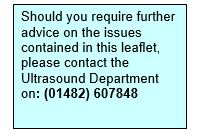- Reference Number: HEY155/2023
- Departments: Radiology
- Last Updated: 31 January 2023
Introduction
This leaflet has been produced to give you general information about your procedure. Most of your questions should have been answered by this leaflet. It is not intended to replace the discussion between you and your sonographer or doctor. If after reading it you have any concerns or require further explanation, please discuss this with a member of the health care team who has been caring for you.
What to Expect Following your HyCoSy procedure
We suggest using a sanitary towel or panty liner directly following your procedure, as you may experience some bleeding and/or some discharge.
Recuperation period
Providing you do not have any immediate post-procedure complications, which are extremely rare, you will be able to leave the department immediately following the procedure.
Results
The sonographer performing the examination will verbally inform you of the results immediately after the procedure. A written result will also be sent to your specialist doctor who referred you for this test. You will be able to discuss the results at your next outpatient appointment.
Recovery period
You can return to work as soon as you feel able. Some people find the examination easier than others. There is no single answer, but in most cases the day following the procedure will be fine.
Advice on follow-up
We advise that tampons are not used immediately following the test but can be used as normal during your next period. You can resume sexual intercourse as soon as you feel comfortable.
Follow-up treatment
A report will be sent to your consultant immediately following your examination. You may already have a follow-up appointment, however if not, phone your consultant’s secretary to inform them that the HyCoSy has been performed. A follow up appointment will then be arranged to discuss future treatment if you need any.
Recovering from your HyCoSy procedure
Here is some information you may require over the next few days.
There are some side effects which are normal following the procedure such as:
- Sticky odourless vaginal discharge. This is the contrast agent which is being expelled by the body.
- Bleeding. This is from the cervix due to the insertion of the catheter and should usually stop within 24 hours.
- Abdominal cramping similar to period pains. This can be controlled with anti-inflammatory drugs such as Ibuprofen or Nurofen. If you are unable to take anti-inflammatory medication, then Paracetamol can be taken. Pain should not last for more than 48 hours following the procedure.
You do not need to take any contraceptive precautions following the procedure as the contrast agent we use will not cause any detrimental effects to a pregnancy conceived after the procedure.
Risks and complications
There is a small risk (1:100 cases) that you may acquire an infection after this procedure. Usually an infection will develop within 7 days of the procedure.
If in the week following your HyCoSy you experience any of the following:
- a high temperature
- aching limbs
- or an offensive smelling vaginal discharge
You must inform your GP as soon as possible.
Tell the GP the examination you have had (a Hystero Contrast Sonography) and your GP will prescribe appropriate antibiotic treatment. Vaginal swabs do not need to be taken. It is important that antibiotic treatment should begin as soon as possible as uterine infections have the potential to block the fallopian tubes.
In order to maintain our records please inform us if you do acquire a uterine infection on tel: 01482 607848.
If you have any concerns regarding pain or bleeding which is not settling phone your consultant’s secretary for advice.
General Information
Please read the information leaflet. Share the information it contains with your partner and family (if you wish) so that they can be of help and support. There may be information they need to know, especially if they are taking care of you following this examination.
This leaflet was produced by the Ultrasound Department, Hull and East Yorkshire Hospitals NHS Trust and will be reviewed in January 2025.
General Advice and Consent
Most of your questions should have been answered by this leaflet, but remember that this is only a starting point for discussion with the healthcare team.
Consent to treatment
Before any doctor, nurse or therapist examines or treats you, they must seek your consent or permission. In order to make a decision, you need to have information from health professionals about the treatment or investigation which is being offered to you. You should always ask them more questions if you do not understand or if you want more information.
The information you receive should be about your condition, the alternatives available to you, and whether it carries risks as well as the benefits. What is important is that your consent is genuine or valid. That means:
- you must be able to give your consent
- you must be given enough information to enable you to make a decision
- you must be acting under your own free will and not under the strong influence of another person
Information about you
We collect and use your information to provide you with care and treatment. As part of your care, information about you will be shared between members of a healthcare team, some of whom you may not meet. Your information may also be used to help train staff, to check the quality of our care, to manage and plan the health service, and to help with research. Wherever possible we use anonymous data.
We may pass on relevant information to other health organisations that provide you with care. All information is treated as strictly confidential and is not given to anyone who does not need it. If you have any concerns please ask your doctor, or the person caring for you.
Under the General Data Protection Regulation and the Data Protection Act 2018 we are responsible for maintaining the confidentiality of any information we hold about you. For further information visit the following page: Confidential Information about You.
If you or your carer needs information about your health and wellbeing and about your care and treatment in a different format, such as large print, braille or audio, due to disability, impairment or sensory loss, please advise a member of staff and this can be arranged.


